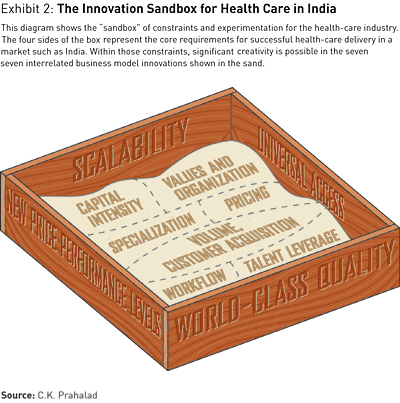“I don’t like to think inside the box, I like to create my own box.”
– C.K. Prahalad, R.I.P. 1941-2010
 Some people preach to the choir; others write new choir songs. C.K. Prahalad, the management guru often named the world’s top business thinker passed away last Friday night at the age of 68. Prahalad became famous for championing a powerful new standard, a new choir song for the world to sing. His was the driving force behind the conceptual framework for doing business at the Bottom of the Pyramid.
Some people preach to the choir; others write new choir songs. C.K. Prahalad, the management guru often named the world’s top business thinker passed away last Friday night at the age of 68. Prahalad became famous for championing a powerful new standard, a new choir song for the world to sing. His was the driving force behind the conceptual framework for doing business at the Bottom of the Pyramid.
Prahalad, advisor or director to many of the world’s top companies, also became famous as a professor at the University of Michigan’s Ross Business School. In classes on strategy, management and innovation, Prahalad used philosophy and ethics as a subject matter to challenge MBA students to examine their own ways of thinking and perceiving the world. He taught that it was self-awareness, personally and organizationally, that empowered business to look beyond the balance sheet to see just how much it could impact society, for better or worse.
A business, Prahalad believed, could ‘make a new box‘ for it self, choosing to provide world-class goods or services at prices affordable for the poorest people in the world, and do it profitably on a large scale, if it so wished. His best selling book, The Fortune at the Bottom of the Pyramid, is filled with examples from Unilever, the healthcare sector, the hospitality sector, and others choosing to make such new boxes for themselves.
Aravind Eye Care, for example, is the world’s largest provider of cataract surgery. They perform over 250,000 surgeries a year and treat 1.6 million patients a year – 60 percent of whom are so poor that Aravind chooses not charge them for services. In order to reduce costs, they produce their own intraocular lenses (a key input) for $3 each, instead of importing them for $60-$100 each. The quality of the lenses is so good that Aravind now exports half its output to the U.S. and other countries, partly explaining how Aravind remains profitable.
Prahalad’s work on bottom of the pyramid business strategies has helped the global business community crystallize a new identity, one built on having a positive impact on the world’s poor. As Prahalad and others have detailed, progress has occurred on that front, in terms of economic development; but in terms of political capacity to protect and enhance economic development for future generations, progress remains in peril.
In step with Prahalad’s vision, perhaps the next challenge for the Bottom of the Pyramid movement is to determine how through daily operations businesses can positively impact public sector practices and the capacity for democratic governance. In so doing, large and small businesses engaged in bottom of the pyramid markets can help economic development support political and civil development for their stakeholders — becoming true corporate citizens in every sense of the phrase.
The notion of corporate citizenship or corporate social responsibility typically gets cast in terms of large-scale projects large corporations administer in partnership with an NGO or other donor-organization. The U.S. Chamber of Commerce’s Business Civic Leadership Center has a library of noble examples. Yet as Prahalad constantly challenged students, colleagues, and CEOs, what businesses do on a daily basis can have a life-altering positive impact on the lives of its consumers, employees, and investors. Positive impact can extend far beyond the economic realm, if businesses so choose.
Published Date: April 19, 2010